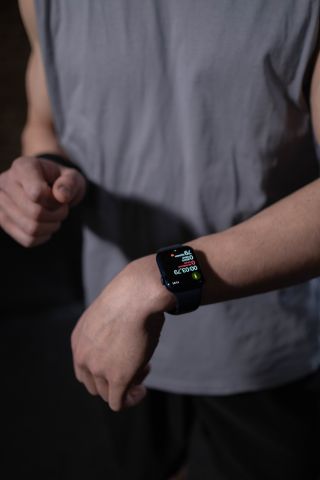Embarrassment
How a Smartwatch Turns Into a Shame Machine
Personal Perspective: For many, exercise trackers can be harmful, not useful.
Posted July 9, 2023 Reviewed by Gary Drevitch
Key points
- Those who struggle with moderation can forget that technology—while perhaps well-intentioned—can be flawed.
- Most such devices' reminders are not random or helpful, and occur at the same times daily.
- Wearables can set unrealistic goals for their wearers, which can contribute to or trigger eating issues.
- We can use how we feel as a truer measure of our mental and physical health.

As someone who took off over 250 pounds of excess weight through healthy eating and exercise, I was excited at the prospect of wearing a smartwatch that would not only track my steps and workouts but also remind me on occasion to stand up at my desk or even take a moment to do a breathing exercise. Sadly, I learned over the years that as someone who could easily obsess over food, I could also obsess about meeting the calorie and workout goals set by my smartwatch. Before too long, I was doing things more for the watch’s acknowledgment than my own health. If the watch indicated that I hadn’t reached my goals by bedtime, I would be the guy walking up and down the stairs until I earned my watch’s approval.
While comical versions of this scenario have played out in various forms of entertainment, the potential problem is very real for people (like me) who never learned moderation when it came to eating and even moving. I would forget that this piece of technology, while perhaps well-intentioned, could also be flawed.
For example, my reminder to work out would come at the same time every single day—about five minutes after I woke up in the morning. Literally two minutes later, I would receive a reminder to meditate. I soon realized that the watch’s “helpful” reminders weren’t random at all: They came at the same times daily and proved more irritating than motivating. Was I not allowed to brush my teeth and use the restroom in the morning before considering working out? Or perhaps to work out at different times on different days? Or even not work out at all on some days? Why was my smartwatch so insistent that I get to the workout within minutes of waking up?
We can blame this potentially harmful technology on programming. It baffles me that the makers of these watches and devices didn’t spend more time programming in more random patterns. But there are other troubling aspects of these devices—including a “movement calories burned” counter that often raises the user's numerical "goals" by itself. Before I realized it, I was being encouraged to complete a very unrealistic daily goal of burning 950 “move calories" (separate of "normal calories" burned).
Not only is this potentially unhealthy, but it also encourages a constant need to prove one's self. For some, this may not be an issue. But for those of us with eating and self-esteem disorders that we’ve been battling for what seems like a lifetime (I started gaining weight in the first grade and topped out at over 450 pounds by the time I graduated from college), this kind of “encouragement” can be very unhealthy and encourage new kinds of disorders all their own: eating too little, moving too much, trying to “please” an electronic device that is not taking our individual lives—or even health—into consideration.
Sure, there are people who can wear and use these devices without being triggered into feeling guilty or less-than—or going to harmful extremes to meet unrealistic goals. But for those of us who’ve worked diligently to love ourselves no matter what size we are or how much exercise we’re getting in a day, this kind of shame from an inanimate object can be damaging. Not to mention, these devices are hardly accurate, extremely inconsistent, and often communicate incorrect data that we could accidentally interpret as the wearer not being good enough.
Some different—and practical—ways to motivate ourselves might include wanting to keep up with the pets or children in our lives, appreciating how our clothes fit, not being breathless when climbing stairs, and liking ourselves when we look in the mirror. The best opportunities for change come from caring about ourselves as we are in the present moment. No smartwatch or wearable can notify us of this. It's something we all already possess. It comes from inside ourselves.
Variety is the spice of life. And while eating healthier and getting enough enjoyable movement is a great way for anyone to live life, we should be doing so out of a love of life and health—not because we want to please a "shame machine" attached to our wrist. How we feel can be a truer indicator that lets us know we’re living our best lives. In other words, we don’t need anyone’s—or anything’s—approval other than our own.


